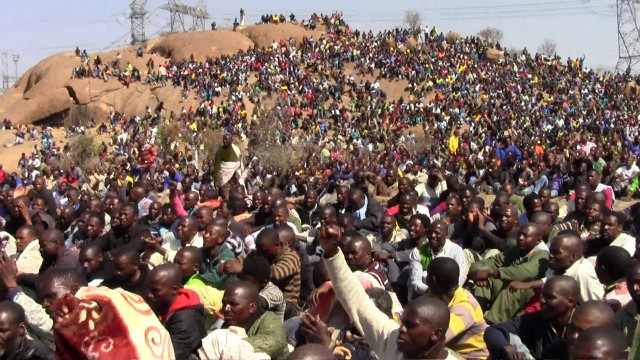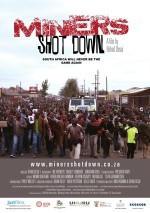‘It’s the most unequal country in the world’: Rehad Desai on the future of South Africa Politics
Interviews, New in Ceasefire - Posted on Tuesday, June 17, 2014 14:28 - 1 Comment
By Usayd Younis and Muaaz Khan

Rehad Desai is a South African filmmaker and academic. His most recent film, Miners Shot Down, was screened at the Sheffield Documentary Festival ‘Doc/Fest’. We caught up with him to understand his take on the situation in South Africa today.
CF: Your film documents the killing of 34 striking workers by police at one of South Africa’s biggest platinum mines. This tragic event occurred 18 years after the fall of the system of Apartheid. Does this event reflect a wider struggle in South Africa since the fall of Apartheid?
RD: This is the political cost for our freedom. The cost of a political democracy was that we were warned very seriously – the mining houses warned the African National Congress (ANC). Nelson Mandela in particular was willing to take that on board: that if they were to nationalise the mines the country would go to the dogs and the mining houses would withdraw their support for the negotiation process and the transition to democracy. This has come home to bite us. Democracy for working people, most of whom live on very low wages (the economy is based on cheap labour), democracy for them is about increasing their quality of life, and wages are obviously critical to that. Since 1994 we’ve seen a general wage repression and over the last 6-7 years a huge increase in food inflation. When you’re on low wages the cost of food and other basic costs of living represent a huge share of that wage. So increased unemployment and a general fall in the standard of living, this is not what the titanic struggle for democracy was about. You can’t separate it from the economics.
CF: In the film you quote Joseph Mathunjwa of the Association of Mineworkers and Construction Union (ACMU): “When we voted 1994 we thought that the working class is liberated. The only thing that we benefited is to change the administration that was lined with the white colour. That is our challenge now. Even though we got our freedom it’s time to change the system.”
RD: It’s a conventional understanding that if you take the political kingdom, the economic kingdom will follow. What actually happens in Africa is the political elite often get co-opted by the economic elite and the vast majority of people get left behind. So fundamental contradictions are made.
CF: There has been a lot of coverage around the environmental degradation and popular resistance against the World Cup in Brazil. What has been the legacy of South Africa’s hosting of the World Cup four years ago?
RD: Well we’ve been left with ten beautiful stadiums, the vast majority of which are essentially white elephants, at a huge cost to the population. The political legacy would be they can build these wonderful stadiums in record time but they can’t build the houses. There’s a huge backlog on housing in South Africa, water, sanitation. We rallied around getting our country ready for the world cup – why can’t we now rally around getting our country in place so everybody can have a reasonable share of the cake?
CF: This film explores how the National Union of Mineworkers (NUM) attacked their own members during the strike. As well as a strong Trade Union movement, South Africa has a number of popular social movements. To what extent do they support each other, and have these events created a disparity between them?
RD: What you’ve seen is SANCO (South Africa National Civic Organisation) which is the fourth, rather non-existent pillar of the alliance, have been split down the middle because pressure from township residents for their organisations to actually come to the table and fight and contest is back now. These organisations have to deliver or they die. The rise of the social movements in the mid to late 90s has seen a decline over recent years and then re-emerged in a much less structured fashion, with popular spontaneous protest. They call South Africa the protest nation of the world, with some of the highest levels of residential protest movements. The ANC often move to co-opt the leadership and pull them into the council structures, provincial structures and then you see the movements often go into decline.
The real challenge now is how we bring the civic movement, which is being re-invigorated with the movement of the economic freedom fighters, together with the re-emergence of militant trade unionism into a new political formation which is being spearheaded by the metalworkers of South Africa. If we can bring the youth and the workers together, as we did in the mid 1980s, back then we knew when we have a million people staying away because the youth had entered the fray (in the province I live in) – a million strong stay away – this was the beginning of the end of white minority rule. I think we could possibly say the same for South Africa in terms of the stranglehold of corporations and capital on our lives. That’s the big challenge facing us.
CF: Could the myriad of radical grass roots movements in South Africa ever pose a serious threat to the ANC’s electoral power?
RD: 70% of the people who vote for the ANC are actually unemployed. The ANC has managed to roll out grants to 15 million people and in many ways this has kept people from absolute poverty and people appreciate that. There’s a lot more that can be done; we’re a mineral-rich country, our economy’s wealth is concentrated in the hands of a small minority which is still predominantly white but increasingly so we have a black middle class. It’s how we bring about reduced levels of inequality – it’s the most unequal country in the world. I think we have very real possibilities and potential to be able to do that but we need a paradigm shit away from the notion of foreign direct investment. We have to understand that we have to take away from people who have in order to give to people who haven’t. There is no middle road. There’s no third way. We can’t wait for the simply on the capitalist economy to grow before we can deliver reforms. Our society will tear itself apart if we wait that long.
CF: How is Mandela remembered by the trade union movement in South Africa
RD: Mandela is remembered very fondly even though it was his policies, his legacy, that we’re now living with. On the way home from the memorial I was listening to the radio in the car, someone phoned in and said this: “Mandela sacrificed his life for his nation. Zuma scarified his nation for his life.” People remember other things Mandela said. “If your new government do the same to you as the old government did to you, then you must do to your new government what you did to the old government,” which is essentially fight it tooth and nail. So there’s a lot in Mandela’s words which we can take heart from and inspiration. But when it comes to his willingness to compromise so heavily in the transition process he has quite a lot to answer to.
CF: Your next films, act II and III, are going to follow the progress of this case?
RD: I’ll be following the trials, following the strike, following a few characters from the economic freedom fighters. A woman from Marikana, who leads the women of Marikana, she’s now an MP. We’ve got local elections in 2016, we’ve got a strike which has been going on for 5 months which is really beginning to bite hard into the economy, we’ve got an increasing turn towards authoritarianism, it’s conflict ridden and more and more polarised. This makes for a good documentary.
CF: Any final thoughts on South Africa’s future?
I don’t think the African National Congress is any longer capable of acting against the interest of capital because there’s a cabal acting inside the ANC of extremely rich tycoons who are dominant. This faction is around President Zuma including Cyril Rhamphosa, the Deputy President, and will not act in any manner which is contradictory to their economic interests.
That’s a recipe for high levels of class struggle. I think it’s only through an organisation that sees the primacy of struggle as the motor of its history. Class struggle is the motor of historical change, that’s when we will begin to see any real fundamental shift in the fortunes of our country.
CF: Thank you for talking to Ceasefire Magazine.
RD: Pleasure, thanks for coming through.
You can find details about the film, campaign and screenings at the Miners Shot Down website: www.minersshotdown.co.za
1 Comment
Rehad Desai on the future of South Africa |




[…] Read the full article here. […]